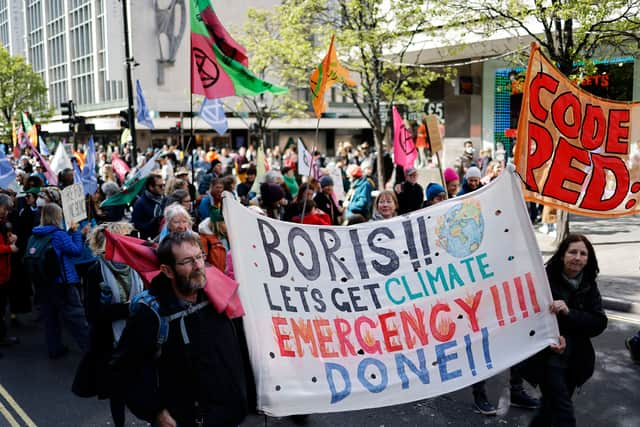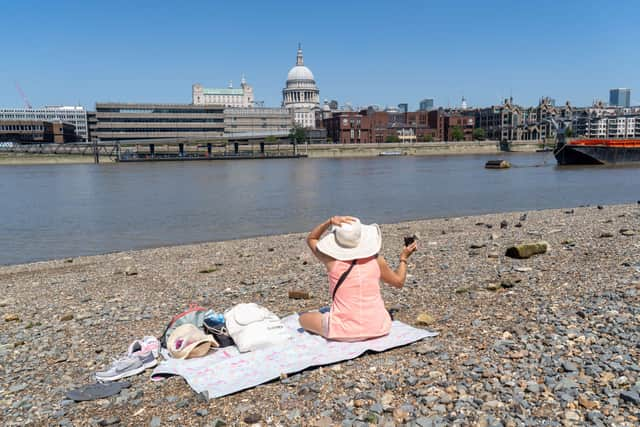Heatwave: Seven of 10 areas of England worst affected by hot weather are in London
and live on Freeview channel 276
Seven London boroughs are among the top 10 areas in England worst hit by the impact of heatwaves, climate researchers have found.
Researchers have discovered the communities set to be worst affected by extreme heat - as temperatures are set to hit 37C in London next week.
Advertisement
Hide AdAdvertisement
Hide AdData has revealed seven of the top 10 worst hit slots in England are taken up by London local authority areas, while of the top 30 areas, 19 are within the Greater London perimeter.
Among the worst affected areas in England are: Newham; Tower Hamlets; Hackney; Southwark; Enfield; Ealing and Haringey.


And in the top 30 are: Waltham Forest; Lambeth; Brent; Croydon; Barking and Dagenham; Lewisham; Islington; Greenwich; Hounslow; Wandsworth; Westminster and Camden.
Millions more older people and children are at risk from dangerous summer temperatures if climate goals aren’t met, environmental scientists at Friends of the Earth (FotE) found.
Advertisement
Hide AdAdvertisement
Hide AdAnd health-risking heat waves will get more intense as the planet warms, the charity warned.
Mike Childs, from FotE, said: “Extreme heatwaves and health alerts like we’re seeing this week, will become much more frequent and severe due to climate change.
“To prevent the most dangerous scenarios becoming a reality, all countries, including the UK, must make greater efforts to prevent runaway climate breakdown.”
Loading....
The analysis, published today (Thursday, July 14) by researchers at the University of Manchester for FotE, identifies people and locations that are most at risk of overheating.
Advertisement
Hide AdAdvertisement
Hide AdOlder people, the ill, young children, those without green space or shelter, or living in high rise buildings or mobile homes, or housing susceptible to overheating, are most at risk.
Hot weather can strain the heart and lungs, sparking respiratory and cardiovascular issues.
The other areas in the top ten worst hit areas are Birmingham; Nottingham and Leicester.
Research looked at areas with average populations of 1,700 and found communities set to be worst hit by global heating had below average carbon footprints - those less responsible.


Advertisement
Hide AdAdvertisement
Hide AdPeople of colour are four times more likely to live in areas at high risk of dangerous heat.
Global temperatures are already 1.1°C above pre-industrial levels, FotE has said, while under the Paris Agreement, governments have agreed to work to limit warming to 1.5°C.
Based on current climate pledges, the world could hit 2.4C of warming, but even these commitments are not being met, with the UK finding only 39% of its own policies credible.
Key climate change findings include:
- 48% of areas (28m people) in England will face very hot weather at 1.5C of warming;
- 60% (34m people) and 81% (46 people) of areas risk extreme heat at 2C and 3C;
- And a global temperature rise of 3C would put 50% of areas (30m people) at risk of ‘dangerously hot weather’ with 30C or more for five or more days.
Mr Childs, head of research at the charity, added: “Suggestions by some politicians that the UK should dial back on climate goals are short-sighted and reckless.
Advertisement
Hide AdAdvertisement
Hide Ad“People on the frontlines of the climate crisis in the UK and overseas are already being hit by its impacts, despite being the least responsible.
“We need governments to double-down on cutting emissions and providing funding for climate adaptation programmes, such as planting street trees.”
Comment Guidelines
National World encourages reader discussion on our stories. User feedback, insights and back-and-forth exchanges add a rich layer of context to reporting. Please review our Community Guidelines before commenting.
